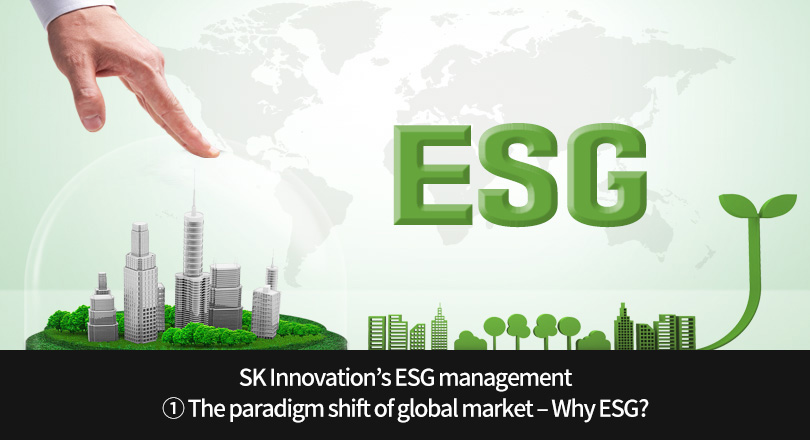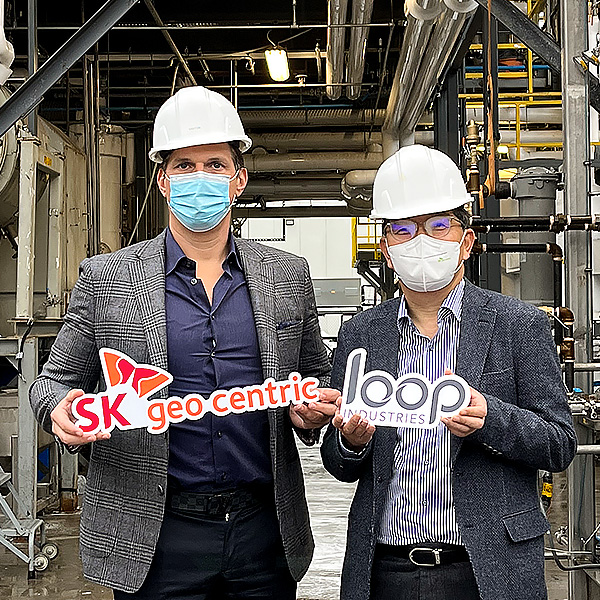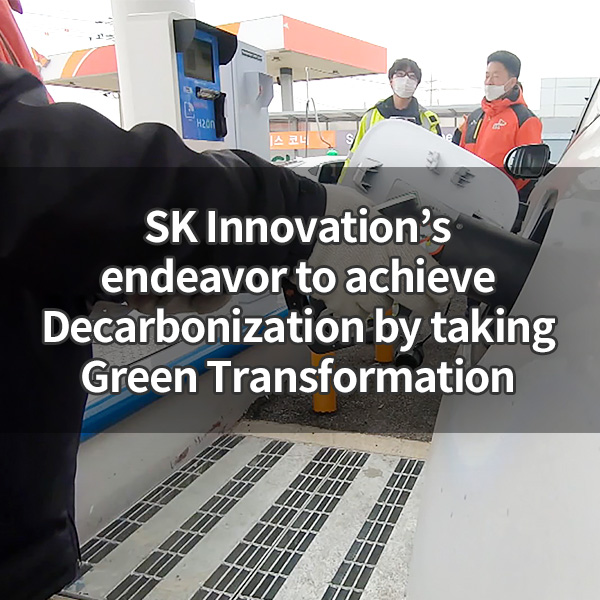2024.09.24
 Series
Series
It has been nearly a year since COVID-19 hit us, and the world is still struggling to battle with the pandemic. We had faced multiple financial crises and other widespread deadly diseases, but our life has never been changed so much and so fast like this year. While COVID-19 stays as the hottest topic, 2020 is also having other major keywords that are all more or less related to coronavirus, and one of them is ESG. ESG stands for Environmental, Social and Governance – the three major criteria to measure the sustainability and social/ethical impacts of an investment.
A research published in July by J.P.Morgan pointed out, “Once a niche, ESG investing is fast growing in every geography and assets,” and the majority of the respondents of the J.P. Morgan investor survey agreed that “COVID-19 crisis should be a positive catalyst for ESG.” Swimming with the tide of the global economy, in the 2020 CEO Seminar of SK Group, Chairman Chey Tae-won emphasized that ESG management is one of the major growth strategies of SK. Chairman Chey also stressed the importance of upgrading measurements of social value creation in the governance of companies during his speech at the World Economic Forum’s annual meeting held early this year, when he attended a panel session entitled “Stakeholder Capitalism in the Asian Century”.
To have a better knowledge about what ESG is, why we need to pay attention to it and how SK Innovation has been preparing for ESG management, SKinno News offer a new series entitled “SK Innovation’s ESG Management for Sustainable Growth.” For the first episode, let us take an overview to find out why the global market has been shifting to ESG by checking the column shared by Jung In-bo, Head of SV Acceleration Squad of SK Innovation.

The paradigm shift of global market – Why ESG?
This summer, Goldman Sachs recommended 20 stocks that would benefir from the European Green Deal, which was announced last year by the European Commission. The EU Green Deal, in order to achieve net zero carbon emissions by 2050, raised its green-house gas emissions reduction target for 2030 from 40% to 50-55% compared to 1990 levels. Taking a close look at the companies recommended by Goldman Sachs, while some are doing well in their existing businesses, some stand out to have succeeded in transforming themselves. Ørsted, a Danish enterprise, is a good example of the latter case. Ørsted was originally the largest oil company in Denmark, producing oil and natural gas in the North Sea. The company used to be known as DONG Energy, in which DONG stood for Danish Oil & Natural Gas. However, as the company shifted its focus to green energy, its whole oil business was sold in 2017, and developing eco-friendly offshore wind power became the new focus of the company. This is also when the company changed its name into Ørsted, which refers to the Danish scientist Hans Christian Ørsted. This was like “pouring new wine into new wineskins”, and the company’s stock price has recently tripled to 950 Kroner compared to 270 Kroner in 2016.
Philip Hildebrand, vice chairman of BlackRock, one of the world’s largest asset manager with 7.3 trillion USD in assets, affirmed that how quickly the company accepts and utilizes ESG (environmental, social, and governance) trends will be the key to winning the global capital market, and whether it is included in the ESG-related ETF (Enlisted Index Fund) index will determine the future corporate value. In the annual letter to its clients earlier this year, Larry Fink, the company’s Chairman and CEO, warned of risks from climate change, saying, “Currently, every active investment team at BlackRock considers ESG factors in its investment process and has articulated how it integrates ESG in its investment processes. By the end of 2020, all active portfolios and advisory strategies will be fully ESG integrated,” and “BlackRock’s alternatives business will make no future direct investments in companies that generate more than 25% of their revenues from thermal coal production.”
ESG, which used to be understood as a mere tool for SR (corporate social responsibility), has become the key determinant of corporate value. The paradigm shift to ESG management is not set to happen in the future but is happening now at a rapid rate. While ESG was often, and still is, misunderstood as the same concept with CSR (corporate social responsibility), these two terms are not identical. In recent years, from the stage of encouraging companies to autonomous voluntarily pursue ESG activities, national legislations to regulate ESG performances management have been created in various countries. Among them, the institutionalization of information disclosure is progressing the fastest, and ESG information disclosure is mandatory for companies with a certain size in the UK, France, Germany, and some other countries. In Korea, the revision (plan) of the Capital Market Act, which covers non-financial information disclosure, is also pending.
Going with the flow of change, SK Innovation’s announcement and implementation of Green Balance 2030, which we ambitiously target to offset all operation-related negative environmental effects by creating more positive ones by 2030, are inevitable.

▲ (Left) CEO & President of SK Innovation Kim Jun promotes the Green Balance 2030 strategy / (Right) SK Innovation’s Green Balance explanation graph
In recent reports, Bloomberg has pointed out that funds and investors tilt more toward ESG-friendly companies. Meanwhile, the successive release of zero-emission plans of companies in various industries, from Apple, Microsoft to Nike, Mercedes-Benz, and so on must have a certain relation with such trend.
Once a company considers ESG a threat, it will be left behind by the wave of changes called ESG. Preferably, companies should take it as an opportunity to resolve the financial discount by using ESG more actively to prove the company’s competitiveness.
This year, SK Innovation has devised an ESG framework that can check our company’s level of ESG and be equipped with countermeasures, and set up improvement tasks for each sector. We plan to raise the level up by various methods, including analyzing companies that meet global market expectations for ESG management. In addition, SK Innovation will develop a control system that delivers our efforts, such as our progress in Green Balance 2030, to stakeholders, including investors and the markets, and ensure that these efforts are fully reflected in our ESG evaluation.
An article released a few months ago on The Financial Times said, “2020 has injected steroids into the ESG movement,” and we would like to add that, “Not only this year but also in the future, opportunities will come to companies that can create financial stories through ESG management.”










 Youtube
Youtube Facebook
Facebook Instagram
Instagram Linkedin
Linkedin






















